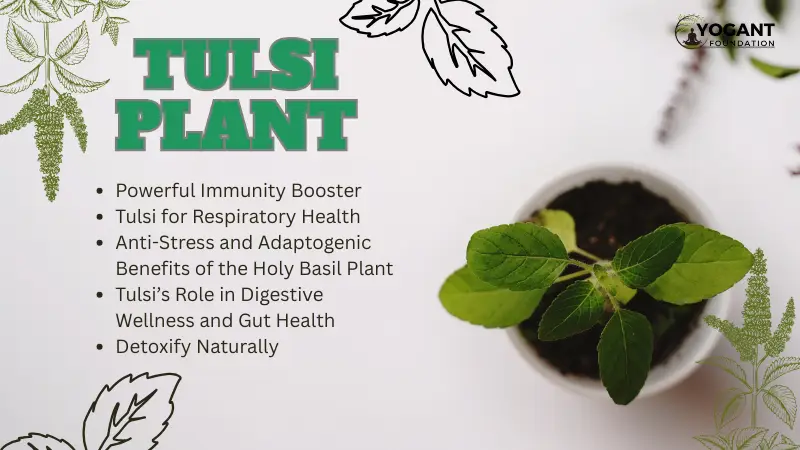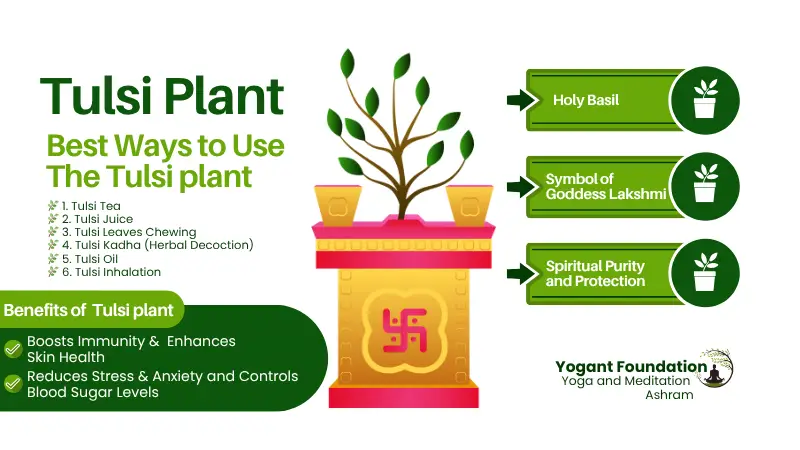Introduction of Tulsi Plants
Tulsi, also known as Holy Basil or Tulsi Plant, is more than an herb. It has a wealth of spiritual, cultural and medicinal importance in Indian culture.
Tulsi, known as the “incomparable” one in Sanskrit, has been respected for centuries. It is valued for its health benefits and as a symbol of purity and devotion.
Many Indian households use the plant as a staple, and people place it on sacred altars to offer daily prayers. People revere the plant for its role as a link between the Spiritual and Physical realms. It reminds us of the connection we have with nature.
Tulsi leaves are a storehouse of centuries-old wisdom. They can be used to treat ailments from stress and respiratory problems, all the way up to anxiety. Aromatic plants are often used to make teas and flavor foods. This helps their healing powers become part of daily life.
Its presence encourages gratitude and mindfulness, which fosters a feeling of wellbeing that goes beyond Physical Health. Tulsi Plant is a symbol of a holistic wellness approach, which integrates body, mind and spirit.
What Are the Benefits of a Tulsi Plant?
Tulsi has many benefits for health and the environment. This is a simplified overview.
1.Boosts immunity
Tulsi boosts immunity. Tulsi is rich in antioxidants and essential oil that fight infections.
2. Combats Respiratory Problems
Tulsi’s antibacterial and anti-inflammatory properties help treat coughs, colds and bronchitis.
3. Relieves stress and anxiety
Tulsi promotes mental and physical balance by helping the body to handle stress.
4. Improves Digestion
This product helps to improve digestion and absorption of nutrients. It also reduces the bloating.
5. Regulates Blood Sugar Levels
Tulsi is good for people with Type 2 diabetes. It helps control blood sugar levels by boosting insulin production.
6. Enhances Skin Health
Tulsi’s antibacterial properties can help clear acne and prevent blackheads it because gives skin a healthy radiance.
7. Heart Health
Tulsi reduces cholesterol and blood pressure, which lowers the risk of cardiovascular disease.
8. Weight Management Aids
Tulsi boosts the metabolism and aids in fat burning, which makes it a popular choice for detox diets.
9. Natural Insect Repellent
Tulsi’s strong scent repels insects and mosquitoes.
10. Environmental Benefits
Tulsi purifies the air through oxygen release and by absorbing dangerous gases such as carbon dioxide.
Types of Tulsi Plant
Each type of Tulsi has its own unique traits. These are some of the more common types:
1. Rama Tulsi (Ocimum sanctum)
Colour: Bright green leaves
Taste: Sweet and mild
Uses: Mostly for religious rituals and teas.
2. Krishna Tulsi (Ocimum tenuiflorum)
Colour: Dark green or purple leaves
Taste: Strong, peppery
Usages: Used in Ayurvedic Medicine for inflammation and breathing disorders.
3. Vana Tulsi (Ocimum gratuitssium).
Colour: Light green leaves
Taste: Spicy and strong
Uses: It grows in nature; it boosts the immune system and contains antioxidants.
4. Kapoor Tulsi (Ocimum kilimandscharicum)
Colour: Leaves with floral fragrance
Taste: Slightly Minty
Uses: In perfumes, and used as an insect repellent.
5. Amrita Tulsi (Ocimum tenuiflorum)
Rare type used for specific spiritual practices.
Medicinal Uses of Tulsi Plant
Tulsi has many health benefits. The active compounds in Tulsi, like eugenol and flavonoids, offer many health benefits.
1. Tulsi for Cold and Cough
Treatment: Combination of Tulsi, honey and ginger.
Effects: Clears congestion.
2. Tulsi to Fight Fever
Home remedy: Cook Tulsi with cardamom and black pepper.
Effects: Reduces fever.
3. Tulsi to treat skin issues
Treatment: Apply Tulsi oil or paste to the affected area.
Effects: For acne, eczema and fungal infection.
4. Tulsi for Oral Health
Treatment: Tulsi powder can be used as a toothpaste.
Effects: Prevents bad breath and ulcers in the mouth.
5. Tulsi to relieve Headaches
Treatment: Breathe steam with Tulsi Oil or consume Tulsi Tea.
Effects: Reduces stress and relieves pain.
6. Tulsi in Cancer Prevention
Compounds that help protect you against cancer.
7. Tulsi and Kidney Health
Home remedy: Combine Tulsi Juice with Honey
Effects: Aids in eliminating kidney stones on a natural basis.
8. Tulsi Eye Health
Remedies: Wash your eyes with Tulsi Water.
Effects: Reduction of eye fatigue and inflammation.

Tulsi Plant Benefits in Hindi | तुलसी के फायदे
तुलसी को आयुर्वेद में ‘जड़ी-बूटियों की रानी’ कहा जाता है। इसके कई स्वास्थ्य लाभ हैं और यह हर भारतीय घर में मिलती है। आइए तुलसी के प्रमुख फायदे जानें:
1. प्रतिरक्षा शक्ति बढ़ाना (Boosting Immunity)
तुलसी शरीर की रोग प्रतिरोधक क्षमता बढ़ाती है, जिससे हम बीमारियों से लड़ सकते हैं।
2. खांसी और जुकाम में राहत (Relief from Cough and Cold)
तुलसी का काढ़ा खांसी, जुकाम और गले की खराश में बहुत फायदेमंद है।
3. मानसिक तनाव कम करना (Reducing Stress and Anxiety)
तुलसी की चाय पीने से मानसिक शांति मिलती है और तनाव कम होता है।
4. त्वचा के लिए लाभकारी (Beneficial for Skin)
तुलसी का पेस्ट त्वचा के रोगों जैसे कील-मुंहासे और फंगल संक्रमण में मदद करता है।
5. मधुमेह में सहायक (Helpful in Diabetes)
तुलसी रक्त शर्करा को नियंत्रित करती है, जो मधुमेह रोगियों के लिए फायदेमंद है।
6. हृदय के लिए फायदेमंद (Good for Heart Health)
तुलसी ब्लड प्रेशर और कोलेस्ट्रॉल को संतुलित रखती है, जिससे हृदय स्वस्थ रहता है।
7. वज़न घटाने में सहायक (Aids in Weight Loss)
तुलसी का सेवन पाचन सुधारता है और वजन घटाने में मदद करता है।
How to Use Tulsi Plant Daily
It can be added to your routine on a daily basis in a number of ways:
- Tulsi Tea: Add honey, lemon and water to the boiled leaves.
- Tulsi Juice: Combine 5-10ml of Tulsi Juice with warm water, and consume it every morning.
- Chewing Raw Leaves: Take 3-5 fresh leaf’s on an empty stomach.
- Tulsi Essential Oil: Use this oil in massage or aromatherapy.
- Tulsi Capsules/Powder: You can find these capsules and powders in any health store.
Spiritual Importance of Tulsi Plant
Tulsi has been revered as a Hindu goddess. In Indian homes you will often find a Tulsi in the courtyard or garden near temples. People believe that the Tulsi because cleans and brings luck into the house when someone lights a Diya lamp near it.
Tulsi Vivah is a celebration of the marriage between Tulsi, and Lord Vishnu. In Hinduism, this event signals the beginning of wedding season.
Growing Tulsi Plant at Home
Tips to Grow a Healthy Tulsi Plant:
- Sunlight: Requires at least 4-6 hours in direct sunlight.
- Soil: Use rich, well-drained soil.
- Watering: Water daily during summer, and alternate days in winter.
- Fertilizer: Use natural compost, or cow dung every month.
- Regular trimming: Trim the plants to encourage new growth.
FAQs About Tulsi Plant
Q1. Can we eat Tulsi leaves daily?
Eating 3-5 Tulsi Leaves every day will help to boost digestion and immunity.
Q2. Can Tulsi be taken during pregnancy?
But in very small quantities. Check with your doctor before using any supplements.
Q3. Does Tulsi Plant cause any side effects?
Tulsi is a powerful herb that can affect your fertility or lower blood sugar if you consume too much.
Q4. Can Tulsi Plant cure COVID-19?
Tulsi may boost the immune system, but is not an effective cure for COVID-19. It may help with prevention.
Q5. Is it okay to chew Tulsi leaves?
Some people believe you should not eat Tulsi because it has mercury. However, there is not enough scientific proof for this claim.
Conclusion
Tulsi is more than just a medicine. It’s a wellness partner from Indian culture. The plant is good for coughs and emotional wellbeing, as well as cleaning your house.
Tulsi is truly “incomparable.” You can chew Tulsi leaves, drink Tulsi tea, and honour the plant. Tulsi can enhance your harmony and health.
Read Blogs: Giloy Plant: Benefits, How to Make




Pingback: Peepal Tree पिपल का पेड़ | Benefits, Cultural and Spiritual